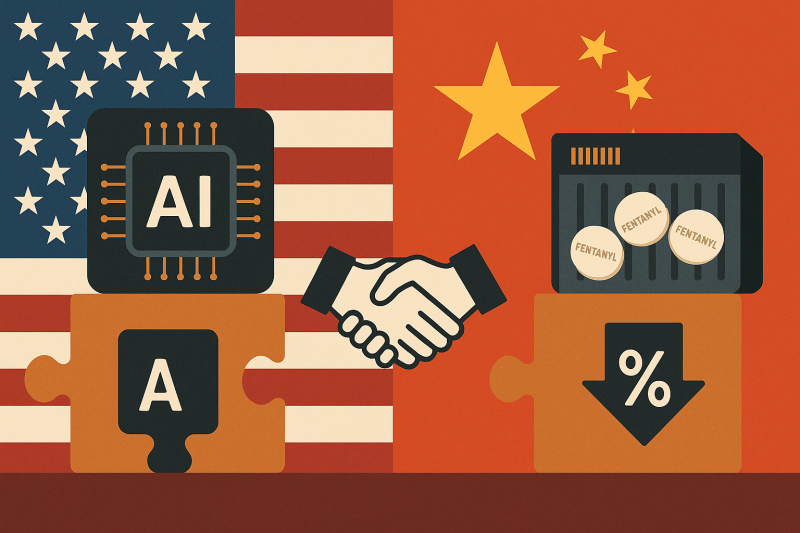Donald Trump is tying together two of the world’s most contentious issues — artificial intelligence and the fentanyl crisis — as he prepares to meet Chinese President Xi Jinping.
Speaking aboard Air Force One en route to South Korea, Trump said he expects to lower US tariffs on Chinese goods in exchange for Beijing’s cooperation in curbing the export of chemicals used to produce fentanyl.
At the same time, Bloomberg reports, he hinted at opening access for Nvidia’s advanced Blackwell AI chips to China, signalling that technology could become a key bargaining tool in new trade negotiations.
Fentanyl tariffs linked to Chinese cooperation
According to Bloomberg, Trump told reporters he anticipated reducing tariffs imposed on Chinese goods over the fentanyl crisis. He said,
I expect to be lowering that because I believe they’re going to help us with the fentanyl situation.
Reports suggest the 20% tariff currently applied to Chinese imports related to fentanyl may be cut to around 10%. The US administration is pushing Beijing to act on exports of precursor chemicals used in producing the deadly synthetic opioid.
Trump said he expected China would start “doing things” to help address the crisis, though he did not specify the size of the tariff reduction.
The move comes as both sides seek to ease tensions ahead of their Thursday meeting, with Trump expressing optimism about achieving what he called a “great deal for both nations.”
Nvidia’s Blackwell chip enters the negotiation table
In a rare development, as per Bloomberg, Trump suggested that Nvidia’s flagship Blackwell AI processor could be part of broader trade discussions.
“We’ll be speaking about Blackwells,” he said, describing the chip as “super duper” and technologically ahead of anything available globally.
Nvidia’s shares rose 8.5% in Asian trading following his remarks, reflecting market optimism over potential access to the Chinese market.
Currently, Nvidia is barred from selling its most advanced AI chips to China under US export controls.
Nvidia CEO Jensen Huang confirmed the company has not sought US permission to sell the Blackwell processor there, as Chinese authorities have blocked imports of such high-end semiconductors.
Nvidia’s market share in China has fallen to zero, even after partial easing of restrictions on less-advanced chips under a deal granting the US government a 15% cut of sales.
Framework for a wider trade agreement
US and Chinese negotiators have already outlined a framework agreement in Malaysia, paving the way for Xi and Trump to finalise a trade deal.
The deal is expected to roll back several tariffs, delay Beijing’s planned restrictions on rare earth exports, and temporarily halt new US export controls on technology software.
In exchange, China has resumed soybean purchases from the US, booking at least two cargoes of American crops for the first time this season.
Washington is also expected to approve the sale of ByteDance’s US operations of TikTok to a consortium arranged by the Trump administration.
If Trump proceeds with halving the fentanyl tariffs, the average duty on Chinese imports would fall to roughly 45%, improving China’s competitiveness against other major US trading partners.
Beijing, which has faced declining exports amid high tariffs, sees tariff relief as a way to stabilise its manufacturing base and sustain growth.
Balancing technology and trade in global strategy
The talks underscore a broader shift in US–China relations, where trade policy now overlaps with technology security and public health.
By linking tariff relief to fentanyl controls and AI chip access, Trump is positioning economic diplomacy as a multi-dimensional strategy that touches on national security and innovation dominance.
While Taiwan is expected to remain off the agenda, the negotiations may reshape how the world’s two largest economies interact in sectors ranging from semiconductors to pharmaceuticals.
The upcoming meeting between Trump and Xi could set the tone for the next phase of global trade — one where chips, chemicals, and geopolitics converge.
The post US–China trade talks shift focus to AI chips, fentanyl tariffs appeared first on Invezz


